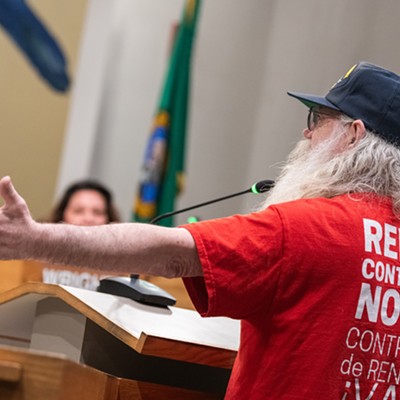What energy crisis?
[
{
"name": "Broadstreet - Instory",
"component": "25846487",
"insertPoint": "4",
"requiredCountToDisplay": "4"
},{
"name": "Broadstreet - Empower Local",
"component": "27852456",
"insertPoint": "8",
"requiredCountToDisplay": "8"
},{
"name": "Broadstreet - Instory",
"component": "25846487",
"insertPoint": "12",
"requiredCountToDisplay": "12"
},{
"name": "Broadstreet - Instory - 728x90 / 970x250",
"component": "27852677",
"insertPoint": "18",
"requiredCountToDisplay": "18"
},{
"name": "Broadstreet - Instory",
"component": "25846487",
"insertPoint": "5th",
"startingPoint": "23",
"requiredCountToDisplay": "24",
"maxInsertions": 100
}
]
by Russell Sadler
Americans are using energy more efficiently than they did 20 years ago. There is no general energy crisis, and there is unlikely to be one.
That is counter-intuitive among environmentalists promoting power from the sun and wind, bewildered columnists branding Americans "energy hogs," and Oil Patch partisans like Dick Cheney, desperate to make some more money in an industry whose price increases have not matched non-energy price increases over the last 20 years.
The drought and inept "utility deregulation" legislation has created a temporary electricity crunch on the West Coast. The unwise entrepreneurial construction of gas-fired generating plants that compete with natural gas utilities for available supplies has driven up prices temporarily. But there is no general energy crisis that justifies panic drilling on the public lands or construction of a power plant a week for the next 20 years, as Cheney recently advised.
There is no energy crisis because Americans are conserving energy. Cheney recently ridiculed conservation as a sign of personal virtue -- Jimmy Carter in a cardigan sweater running around the White House turning out the lights and turning down the heat during the late-1970s. That is not conservation. That is crisis management.
Conservation is improved technology -- more efficient appliances, tougher building codes and more efficient manufacturing processes. And that is just what has been improving over the last 20 years.
Between 1980 and 2000, energy consumption in the U.S. rose just 25.6 percent despite a 90 percent increase in the real gross domestic product, according to figures compiled in a recent Forbes magazine article by Dan Ackman.
That is a major decline in energy use relative to economic output -- a classic definition of efficiency. Nor was that conservation produced by the "price signals" so beloved by economists. In the last 20 years, energy prices rose just 44.8 percent -- most of it in the last two years -- while non-energy prices rose 119 percent. This explains why America's oil cartel is actually closing refineries to restrict supply and boost prices.
The single important exception to this increase in energy efficiency is transportation. Fuel efficiency of American automobiles actually declined in the mid-1990s. The villain? The relentless promotion of high profit margin sports utility vehicles. The high profile, gas-gulpers are also probably responsible for the false impression that America continues to be an energy hog.
The U.S. holds 4.5 percent of the world's population and consumed 25 percent of the world's energy. But according to data compiled by the World Bank, the U.S. produced nearly 28 percent of the world's product with that energy and still makes a claim to energy efficiency.
Energy "intensity" is another measure of energy efficiency. From 1973 to 2000, the U.S. economy became 42 percent less energy "intense," according to the Department of Energy's Monthly Energy Review. This jargon simply means it took less energy to produce the same amount of goods and services.
Ackman, in his Forbes article, attributes the increased efficiency to smart business practices, not "government intervention." But the influence of government is probably larger than Steve Forbes' capitalist tool wants to admit. Saving energy is smart business, but it was state and local building codes that compelled greater efficiency in industrial, commercial and residential construction. Government regulations protecting the environment are a major influence in the increased energy efficiency of industrial processes.
The problem for the oil, gas and coal industries is that this continuing growth in energy efficiency doesn't make them any money. That is the reason the Bush-Cheney administration is cutting all federal funds for programs that make alternative sources of energy more efficient. The Oil Patch doesn't want the competition.
This long period of increased energy efficiency nationally does not eliminate the need to reduce electricity and water consumption on the West Coast this summer and next winter. The drought is real, and it has dried up a large chunk of the West's hydroelectric power. It will take personal virtue, not oil from the arctic or the intermountain West, to bail us out of this temporary, man-made crisis.
Russell Sadler is a contributor to Writers on the Range, a service of High Country News (www.hcn.org), He is a veteran Northwest reporter and professor of journalism at Oregon State University.
Americans are using energy more efficiently than they did 20 years ago. There is no general energy crisis, and there is unlikely to be one.
That is counter-intuitive among environmentalists promoting power from the sun and wind, bewildered columnists branding Americans "energy hogs," and Oil Patch partisans like Dick Cheney, desperate to make some more money in an industry whose price increases have not matched non-energy price increases over the last 20 years.
The drought and inept "utility deregulation" legislation has created a temporary electricity crunch on the West Coast. The unwise entrepreneurial construction of gas-fired generating plants that compete with natural gas utilities for available supplies has driven up prices temporarily. But there is no general energy crisis that justifies panic drilling on the public lands or construction of a power plant a week for the next 20 years, as Cheney recently advised.
There is no energy crisis because Americans are conserving energy. Cheney recently ridiculed conservation as a sign of personal virtue -- Jimmy Carter in a cardigan sweater running around the White House turning out the lights and turning down the heat during the late-1970s. That is not conservation. That is crisis management.
Conservation is improved technology -- more efficient appliances, tougher building codes and more efficient manufacturing processes. And that is just what has been improving over the last 20 years.
Between 1980 and 2000, energy consumption in the U.S. rose just 25.6 percent despite a 90 percent increase in the real gross domestic product, according to figures compiled in a recent Forbes magazine article by Dan Ackman.
That is a major decline in energy use relative to economic output -- a classic definition of efficiency. Nor was that conservation produced by the "price signals" so beloved by economists. In the last 20 years, energy prices rose just 44.8 percent -- most of it in the last two years -- while non-energy prices rose 119 percent. This explains why America's oil cartel is actually closing refineries to restrict supply and boost prices.
The single important exception to this increase in energy efficiency is transportation. Fuel efficiency of American automobiles actually declined in the mid-1990s. The villain? The relentless promotion of high profit margin sports utility vehicles. The high profile, gas-gulpers are also probably responsible for the false impression that America continues to be an energy hog.
The U.S. holds 4.5 percent of the world's population and consumed 25 percent of the world's energy. But according to data compiled by the World Bank, the U.S. produced nearly 28 percent of the world's product with that energy and still makes a claim to energy efficiency.
Energy "intensity" is another measure of energy efficiency. From 1973 to 2000, the U.S. economy became 42 percent less energy "intense," according to the Department of Energy's Monthly Energy Review. This jargon simply means it took less energy to produce the same amount of goods and services.
Ackman, in his Forbes article, attributes the increased efficiency to smart business practices, not "government intervention." But the influence of government is probably larger than Steve Forbes' capitalist tool wants to admit. Saving energy is smart business, but it was state and local building codes that compelled greater efficiency in industrial, commercial and residential construction. Government regulations protecting the environment are a major influence in the increased energy efficiency of industrial processes.
The problem for the oil, gas and coal industries is that this continuing growth in energy efficiency doesn't make them any money. That is the reason the Bush-Cheney administration is cutting all federal funds for programs that make alternative sources of energy more efficient. The Oil Patch doesn't want the competition.
This long period of increased energy efficiency nationally does not eliminate the need to reduce electricity and water consumption on the West Coast this summer and next winter. The drought is real, and it has dried up a large chunk of the West's hydroelectric power. It will take personal virtue, not oil from the arctic or the intermountain West, to bail us out of this temporary, man-made crisis.
Russell Sadler is a contributor to Writers on the Range, a service of High Country News (www.hcn.org), He is a veteran Northwest reporter and professor of journalism at Oregon State University.
















